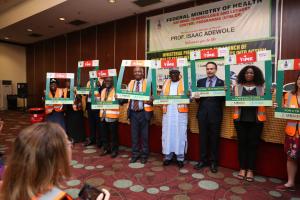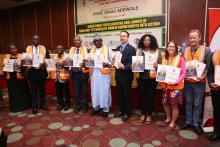Nigeria study confirms that TB is utterly impoverishing for many in the country
Abuja, 25 March 2019- The Nigerian Federal Minister of Health on 25 March 2019 launched a report of a catastrophic cost survey on TB concluded in 2018.
Presenting the document in Abuja, as part of weeklong World TB Day commemoratory activities, the Minister of Health, who was represented by Mr Felix Ogenyi said, “In Nigeria, TB, a disease that affects mostly the poor and low socio-economic population, usually leaves the patient and households with devastating financial loss.” A survey was conducted between 2017 -2018 to confirm this and to evaluate its impact.”
The results of this survey have revealed that nearly 60% of tuberculosis patients live below the poverty line; 89% of multi drug resistant (MDR) patients faced catastrophic costs compared to 69% of drug-susceptible (DS) TB patients. In addition, over 54% of TB patients were unable to pay for TB treatment from their income alone and had to rely on loans or selling their assets to afford treatment. This is on top of the treatment support provided by the Government and Development Partners.
Additional findings from this Nigeria’s first national survey on costs incurred by TB patients and their households revealed that at least 71% of the TB-affected households face catastrophic financial burdens as a result of the disease.
The Minister promised that the Federal Ministry of Health will continue to work with partners to reduce the high financial burden being experienced by TB patients and their household. “We have incorporated TB in the benefit package of the national and state health insurance schemes progressively being implemented.” He also pointed out that a national domestic resource mobilization committee has been setup and is already working on a public-private model to scale up TB care in health facilities across Nigeria.
The catastrophic cost survey was initiated 2017 to assess the magnitude and main drivers of costs incurred by TB patients in Nigeria across 40 local government areas in 22 States.
Results of the survey showed that TB patients and their households incur high costs and lack financial protection due to delayed treatment of the disease. Some of the major costs drivers include non-medical expenses such as purchasing additional food and travel. Equally, social support, health insurance and improved models of TB care can help to mitigate direct and indirect medical costs.
Speaking at the event, Dr Nobu Nishikori of the World Health Organization (WHO) Global Task Force on TB said, “One of the three targets of the End TB strategy is to ensure that no TB patients or their household should face ‘catastrophic total costs’ as a result of TB. “
According to him, the aim is in line with policy efforts countries are pursuing towards Universal Health Coverage or Target 3.8 of the SDGs (achieve universal health coverage, including financial risk protection, access to quality essential health-care services and access to safe, effective, quality and affordable essential medicines).
The catastrophic cost study report was launched alongside a roadmap to implement the September 2018 United Nations High Level Meeting on TB declarations.




